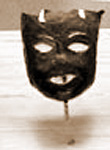FOREWORD
Some years ago, in a working class neighborhood not far from the Blackbird office, on a gray, rainy, bone-chilling afternoon in mid-November, a man in late middle age was sitting on his porch steps, talking to his cat. Both cat and man showed the physical scars of rough living: bent nose, missing teeth, bitten ear, ragged fur. The man said to the cat, “It’s a gray day, it’s just an Edgar Allan Poe day.” Then he proceeded to recite “The Raven.” The cat appeared to be attentive.
The story illustrates one of the many ways in which Edgar Allan Poe, like so many figures in this haunted city’s history, has never left Richmond. Long after 1849, after the well-received evening on Grace Street, the trip to Norfolk, the final reading, and the packet boat voyage to Baltimore, when Poe dissolved into the ether of time, something of him lingered here. We at Blackbird are more than happy to recognize our man of letters on his bicentenary.
In naming Blackbird, as we stated at its inception, we were giving a bow to Poe, as well as to Wallace Stevens and The Beatles, a varied aesthetic family tree that we aim to honor in all of the work that we publish. But Poe actually walked down this street, in our neighborhood.
While he certainly lived within the limitations of his time and the consequences of his chemistry, Poe’s was an ambitious undertaking: to make a literature in a country where culture was suspect and nonremunerative. Poe did not set out to create American literature, but to join an international conversation about the nature of poetry, of narrative, and of criticism. His was a quick and adventuresome sensibility, driven in equal parts by economic necessity and artistic capacity. Reinvention often defined Poe, but it was a reinvention directed toward accomplishment and discovery.
We therefore dedicate this issue of Blackbird to Edgar Poe and call to your attention the writers published here, who, with their work, continue Poe’s conversation as representatives of the great variety of voices that now characterize American culture. (Also, we suggest that you mouseover our editorial staff photo, where we make a bow of another sort.)
Appropriately, we honor Poe’s forward-looking inventiveness in this spring issue, when we publish our annual Introductions Loop. This selected group of five authors—all at the beginnings of their lives in literature—awaken us to the surprises, depths and pleasures language can provide. Poets Nicky Beer, Kara Candito, and Anna Journey offer sensually striking, rapidly developing poems which rivet our attention, while fiction writers Taylur Ngo and Thomas Cooper corner an immigrant boy and a damaged reprobate in the crosshairs of lives constrained by time and circumstance.
Poe might have argued that all poetry becomes, at some juncture, a communion with the dead—that through poems an eternally haunted and haunting sort of conversation is made possible for those willing to listen carefully enough. It survives as “that music behind the glass” that closes Jean Valentine’s epistolary homage to the late Reginald Shepherd. It gazes out through the eyes of the troubled narrators in Phil Levine’s poems in prose as they journey through the literal and figurative darknesses of their lives. Nick Admussen hears echoes of it in the language of police reports and Julie Funderburk lays it out for us at the quantum level of her “spinning particles,” line by precious line. It lures us to the luminous credulity that the “Dear P.” who enlivens the elegiac love letters of Victoria Chang might be old Edgar A. himself, still up for another round of beverages and a tale or two.
New fiction by Christine Schutt distills snippets of sexual attraction into their manifestation as gesture observed or imagined. Claire Bateman tests narrative without line—story as language and commentary. Michael Croley and Alexis Apfelbaum tack more traditionally into certain personal miseries that still make good tales.
In the Gallery, if mystery retains its odd attraction, then Myron Helfgott’s collection of objects, married to a ruminative audio text, leaves us grasping just beyond what we can recall, to try to fix an idea or an association that is receding in synapse or in time. G.K. Wuori’s play aims for another kind of fix, a correction in condition that trucks in the fragility of justice, and justice wears the face of fading memory. Emily Smith analyzes the geometric complexities of Sol LeWitt’s Wall Drawing #541 as it is reinstalled at the Virginia Museum of Fine Arts.
In addition to the Introductions Loop, readings by Claudia Emerson and Jean Valentine appear on the Features menu. Emerson’s reading was recorded as a part of the Poetic Principles reading series produced jointly by New Virginia Review, Inc., and the Virginia Museum of Fine Arts. It is accompanied by an introductory essay by Randy Marshall. Other readings and essays in this series will appear as Features over time.
Jehanne Dubrow’s essays on life as a navy wife, a surprising sidelight for a poet, anchor our nonfiction offerings, and discussions of new books by Jennifer Chang, Aaron Baker, Linda Bierds, and others round out the issue as Blackbird’s expanding cadre of crack reviewers ply their velvet-wrapped tomahawks in the service of hewing meaning from a contemporary thicket of emerging work (thus reaffirming the importance of an activity to which Poe applied himself with legendary gusto).
This issue also offers our first Featured Blog, Mindbook, by distinguished poet T. R. Hummer. His commentary and musings on poetry are linked under the Featured Blog header on our Foreword page right menu.
It was in late September 1849, when, after the reading two blocks away, our man of letters stepped into a dusty road that is now Grace Street to begin his final excursion east and north. We know no more of what his thoughts were on that occasion than we know of the truth of that lost day in Baltimore (rounded up to vote the ticket, plied with drink?), but we can imagine that rather than taking a carriage, he decided to stroll under the distant stars, past open fields, back to the city, reflecting on a renewed acquaintance with Elmira Shelton, a possible return to Richmond. And, today, through the hustle and bustle of a twenty-first-century university, on a now noisy thoroughfare, we still feel his shadow pass. ![]()
Return to top menus | Browse issue











